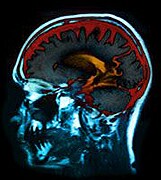Protein Key to Brain Rewiring
It sends signals, telling neurons to change connections.
By Randy Dotinga
HealthDay Reporter
|
E-mail this article
Subscribe to news
Printer friendly version
|

(SOURCES: Takao Hensch, Ph.D., professor, molecular & cellular biology, Harvard Medical School, and professor, neurology, Children's Hospital Boston; Paul Sanberg, Ph.D., director, Center of Excellence for Aging and Brain Repair, University of South Florida College of Medicine, Tampa; Aug. 8, 2008, Cell
)
THURSDAY, Aug. 7 (HealthDay News) -- Scientists say they're gaining insight into how the brain rewires itself as it learns new things, potentially helping them move toward better treatments for mental illness and brain injuries.
Researchers report that a protein appears to tell the brain that it's time to start rewiring, because new information is coming in.
While the study only looked at mice, the protein "could become a great clinical tool" in humans, said study co-author Takao Hensch, a professor of neurology at Children's Hospital Boston.
At issue is the brain's "plasticity," or ability to change itself as it learns. The brains of young children are the most adaptable, because they can physically rewire themselves.
"You actually have neurons reconnecting from one cell to a different cell," Hensch said. "This kind of dramatic rewiring happens predominantly, if not exclusively, in [early] development."
The brain's ability to adapt to new information explains why children have a much easier time learning languages than adults, Hensch said.
But over time, the brain becomes more settled in its ways. "The ability to rewire neurons in that physical way seems to become much harder with age," he said. "Evolutionarily, somehow it seems to be advantageous to stop that process, to stabilize the networks in your head and go on with life."
In the new study, published in the Aug. 8 issue of Cell, Hensch and colleagues looked at a protein called Otx 2 in mice.
Using a test involving the visual system, the researcher found that the protein acts as a signal to tell the brain that crucial information is coming in from the eyes.
"It's a surprising mechanism," he said. "It indicates that the sensory organs in the periphery -- the eyes at the front of the head -- have a mechanism to tell the brain when the eyes are ready and actually seeing something meaningful."
If scientists understand the protein's function correctly, it could mean that "every sensory system has some kind of message to send to the brain to make it plastic at some time," Hensch said.
It's possible that researchers could develop a way to "turn on" brain plasticity in older people, such as those with mental illness or brain injuries. Since the Otx 2 protein sends signals from the eyes, it may be possible to give treatments through eyedrops, Hensch said.
The findings are important and "start to tell us how external information can directly affect molecular mechanisms of the brain," said Paul Sanberg, director of the University of South Florida College of Medicine's Center of Excellence for Aging and Brain Repair.
The research could indeed be used to help scientists find new drugs to help the brain repair itself following damage, Sanberg said. However, "there are still many more studies that need to be done to understand plasticity in other parts of the brain and how to translate it to human problems."
More information
Learn more about brain plasticity from the University of Washington. 
Copyright © 2008 ScoutNews, LLC. All rights reserved. 
HealthDayNews articles are derived from various sources and do not reflect federal policy. healthfinder.gov does not endorse opinions, products, or services that may appear in news stories. For more information on health topics in the news, visit the healthfinder.gov health library.